
Global health scare barely gets a mention
I read a fabulous piece of journalism this week. It ran to 8,000 words and told its story in a straightforward, compelling and totally unsensational style; its narrative chronological rather than the “punchy intro, then restart” convention of news reporting. Well, it was a feature. It will have told readers much they didn’t know, and a great deal that they should be worried about, but was not the result of exhaustive investigation on the part of the writer.
This was the story, related in January 2016 by Nathaniel Rich of the New York Times, of the lawyer Rob Bilott and his single-minded battle against DuPont, the makers of Teflon, over pollution that poisoned people, livestock, wildlife, causing cancers and foetal deformities. It was Bilott who did all the hard work, forcing into the open the pollution and cover-ups going back decades, winning compensation for his clients. But it was Rich’s piece that brought the scandal to wider public attention and led to the Mark Ruffalo film Dark Waters.

Journalism matters: telling stories that people need, rather than want, to hear. At no point since the publication of that feature have the NYT or Rich sought to put themselves centre stage, other than passing mentions in follow-up stories or book and film reviews that their article was the basis for the film screenplay. They recognise their role as conduit, that Bilott is the hero, Ruffalo the people magnet. The contrast with the “Look at our brilliant investigation” chest-beating of our newspapers could not be more stark – think “It was the Sun wot won it!” or “Mail’s stunning victory for Post Office victims” or the Daily Express crusade, “We force government climbdown”.
These are the “happy endings” to a bit of tub-thumping. Dark Waters has a sort-of happy ending, too. The closing credits tell us that a jury awarded the first couple whose case went to trial $1.6m, the second $5.6m damages and the third $12.5m. DuPont then settled the remaining claims for a total of £670m (further claims after the film was released led to another $83m being paid out in 2021).
But there was no suggestion of a happy ending in Rich’s feature. When he wrote it, only the first case had been decided and there was every sign that DuPont would continue to deny liability, forcing every individual case to trial. That, wrote Rich, would mean it continuing to contest cases until the year 2890.
And these cases from Parkersburg, West Virginia, were only the tip of a very large iceberg. They concerned a specific fluorochemical called PFOA and a specific community. There are thousands and thousands of other fluoride-based compounds, called PFAS – or “forever chemicals” because they don’t break down – that are unregulated and unmonitored. Everyone on the planet is affected by them. More law suits are in train, Bilott is still fighting, authorities around the world are – slowly – taking action: Holland announced last week that it was holding 3M (which initially supplied DuPont with PFOA) liable for polluting the Western Scheldt river; a few days earlier, Canada announced that it was considering a ban on firefighting foams, cosmetics and food packaging that contain PFAS. In March – more than 20 years after Bilott first alerted it to concerns – America’s Environment Protection Agency said that it was imposing limits on six “forever chemicals” in drinking water.
So, it’s a story that has been building for two decades, a story that affects us all – scientists have shown that 99% of all people have PFOA in their blood – and one that has been growing in the public awareness. And what have our newspapers been doing with it? Well, they all reviewed the film. In July 2016, the Glasgow Herald noted towards the bottom of its markets round-up that the share prices of DuPont and Chemours – a spin-off company that is taking the hit from the court cases – had been knocked by that $5.6m court payout. In November 2018, the Sunday Times included a documentary called Poisoning America – the Devil We Know, which preceded Dark Waters, in a viewing guide. And last month the FT ran a downpage story headlined “EU ban on ‘forever chemicals’ would hit green transition, warns industry boss”. The industry boss in question was Mark Newman, the chief executive of Chemours, which is still dependent on the production and use of PFAS. He pointed out that fluoropolymers were necessary for the production of electric cars, batteries and semiconductors, among many other things, so a ban would hit green technologies.
But is the EU going to ban thousands of chemicals? If so, why hasn’t it been reported? Because, even after Brexit, that would have a huge impact on our industry and our lives, for they are used almost everywhere - in textiles, in cookware, and in medical supplies.
Maybe, maybe not. In February, the European Chemicals Agency announced a consultation on proposals from Germany, Sweden, Norway, Denmark and the Netherlands to ban or at least restrict the production, use and import of more than 10,000 PFAS because of the dangers to human health and the environment. The suggestion is that an outright ban would be imposed on some uses where alternatives are already available – such as food packaging and ski wax – within 18 months of the rule coming into force (probably 2026 or 2027). In other cases, industries would be given up to 12 years to phase out their use.
This is a big deal. But none of our newspapers reported that announcement, the launch of the six-month consultation in March, or the online information session last month. I would have expected “EU to ban our frying pans” horror from the Express or “Clampdown on poison chemicals” from the Guardian. But nothing. The Guardian does have absolutely reams on PFAS online – 12 items this month alone – but (as with the Mirror) the only mention in print is in relation to river pollution, which has finally become a political issue.
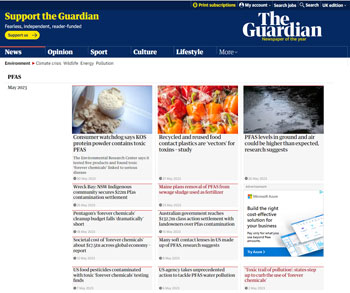
The FT at least has cottoned on, running a full-page feature on Tuesday last week. As with its news story last month, it started with Mark Newman. In this case, him saying he’d been mobbed like a rock star at a conference in Japan by customers demanding more of his company’s PFAS. It’s a well-written feature, naturally business-oriented, examining the impact of any legislation and what companies are already doing to prepare for it.

Meanwhile, here in the UK, the Health and Safety Executive called for evidence over two months from December 2021 and is expected to make recommendations for a post-Brexit regulatory regime in the coming months.
Which all takes me back to my original point: good newspapers tell readers what they need to know. Ours are too busy telling us what they think we want to know – and, more cynically, what they want us to know and what we should think about it.
Political donations: who’s giving to who

The lack of coverage of PFAS in titles like the Telegraph, Sun and Mail is perhaps unsurprising, given their green-sceptic outlook and distaste for eco-luvvies preaching from Hollywood. For them, the villains of the environment war are not the polluters but the protesters. They’ve had it up to here with the “eco-mob”, be they XR or Just Stop Oil. How dare they disrupt the snooker or, even worse, the Chelsea Flower Show with – gosh, fetch me my smelling salts – orange powder?
Yes, they’re a pain in the backside and spoilsports, but where’s the sense of proportion? Was a bit of dust over a show garden really the most important issue to concern Mail readers last Friday? And, as to the headline, hasn’t the government just enacted stringent anti-demo legislation that means you can be sent to jail for ten years for daubing paint on a statue?

But these people and their backers are clearly the scum of the earth – hence the “fury” that someone who bankrolls Just Stop Oil also helps to fund the Labour party. Keir Starmer should return a £1.5m donation from a green energy boss because it’s tainted money, according to the Mail splash on Tuesday. As ever, the “fury” was all in the mind of the paper and completely absent from the text, although there was a line-up of usual suspect Tory MPs – Jacob Rees-Mogg, Suella Braverman, Paul Bristow – to denounce the donation.
But here’s the proof that Labour is in hock to these maniacs: JSO is demanding a halt to all future licensing for the exploration, development and production of fossil fuels in the UK, while Labour is promising to halt all future licensing for oil and gas exploration in the North Sea.
Because Tory donors’ objectives and those of the government never coincide.
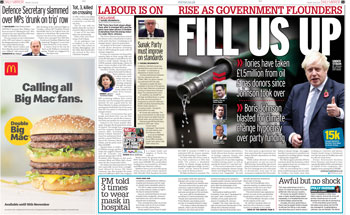
In other news, the environmental website Desmog reported in March 2020 that in the three months after the last general election, the Conservatives had received £1.5m in donations from polluting industries or funders of climate denial. In November 2021 – shortly before the Cop26 climate summit in Glasgow – the Mirror reported that the party had received £1.5m (don’t you just love the symmetry of these figures) from oil and gas donors under Boris Johnson’s leadership. In March this year, the Guardian reported further Desmog analysis of Electoral Commission returns showing that the Conservatives had received £3.5m from “entities and individuals linked to climate denial, fossil fuels and polluting industries” in 2022.
Well, that could be subjective, couldn’t it. On the day before that report appeared in the Guardian, it splashed on government “gambling” on carbon capture schemes – burying CO2 under the sea. Last week it reported that the first exploration licences had been issued. This, according to a Thunderer column in the Times by Offshore Energies UK chief David Whitehouse, was a great opportunity that could make Britain a world leader and breathe new life into industry.
One of those licences was granted to a company called EnQuest. Over the past ten years, the EnQuest chief executive has given the Conservative party half a million pounds.
Oh, and then there’s all that money linked to Russia. And Labour calling on the Tories to return £2m in donations after the Ukraine invasion. That, according to the Mail, was “rank hypocrisy”.
#MeToo: still work in progress
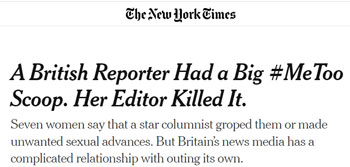
It’s been a bit of a New York Times week here at Gerard Towers, for another article caught my eye, this time about the FT. The “Old Grey Lady” has a reputation among some of our newspaper columnists for being anti-British – they like to point out that contributors include “disaffected” Brits who “can’t get their work published” here. In this case, though, the story was written by an NYT staffer – UK-based investigative correspondent Jane Bradley, whose brief is to focus on uncovering abuses of power, financial crime and corruption.
Bradley’s piece was about the former Guardian and Observer columnist Nick Cohen, who left the company after a number of women colleagues accused him of sexual assault and harassment. Some of the complainants felt he was let off lightly and that they had been betrayed when executives paid tribute to his "brilliance" on his departure. If you’re a media nerd, you may have heard about all this, but it was hardly big news.
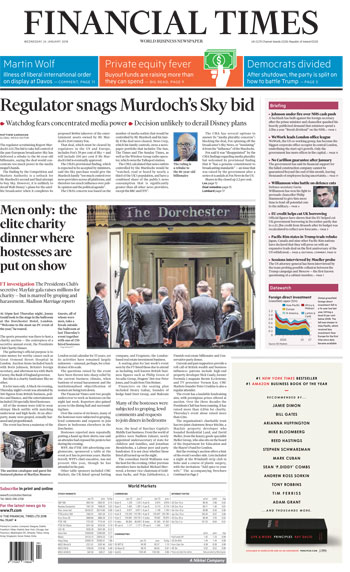
Before Cohen left, Madison Marriage of the FT got wind of the complaints, started investigating and found at least two women willing to speak on the record. They must have thought their ship had finally come in after years of complaints falling on deaf ears, since Marriage had caused a huge stir a couple of years earlier with her exposé of a charity fundraiser where hostesses were put on show and groping was the order of the night.
But her work never saw the light of day. It was spiked by editor Roula Khalaf who, according to Bradley’s contacts at the paper, ruled that Cohen did not have a big enough business profile to make him an FT story.
She probably had a point. He’s known to his readers and in journalistic circles, but he’s not Philip Green.
But Bradley describes this as a window into the British media’s complicated relationship with the #MeToo movement. While American titles had confronted allegations of misconduct, there had seemed to be no such reckoning over here; the whole industry seemed to be protecting itself. She quotes Lucy Siegle, the environment reporter who has been the most vociferous in her complaints against Cohen, as saying: “It just amplified this sense that #MeToo is nothing but a convenient hashtag for the British media. The silence on its own industry is just really conspicuous.”
You could say that again. Just as we have seen over recent weeks how reticent our newspapers were about reporting the Duke of Sussex’s court actions against them, so they also pretend that there is no bullying or harassment in their offices. The sexism, the gropings, the homophobia, the crying steps, the “vagina monologues” all go unreported. Because we live in the real world and work 14-hour days and snowflakes just need to get on with it. And anyway, no one is interested in what goes on in newspaper offices. It’s all navel-gazing.
Except, it wouldn’t be if it were any other organisation with a big public profile.
Target Schofield

Like ITV. Because there is absolutely no escaping what has clearly been by far the most "important" story of the past fortnight: Holly and Phil. Everybody feels compelled to offer their great insights. It has been the Sun splash for seven of the past 11 days, the Mail splash twice, a puff for the Express on four of the past five days. Phillip Schofield has taken such a pummelling, that I feel the same queasiness that I had for Ant McPartland a couple of years ago. Whatever the rights or wrongs of his behaviour, how much of this can anyone take?
There are, of course, legitimate questions to be asked about Schofield’s relationship with a teenage boy for whom he found a job on the This Morning programme. But beyond that, it becomes tittle tattle. Unless you genuinely believe that the prevailing atmosphere in the workplace is an important concern. In which case – as Bradley suggests – isn’t it time to look to thyself?
And what is the Press role in all this? The coming-out in February 2020 that was given such “friendly” coverage? Was this, as is now suggested, because of the affair with the young man, or because a tabloid was threatening to out him if he didn’t do it himself?
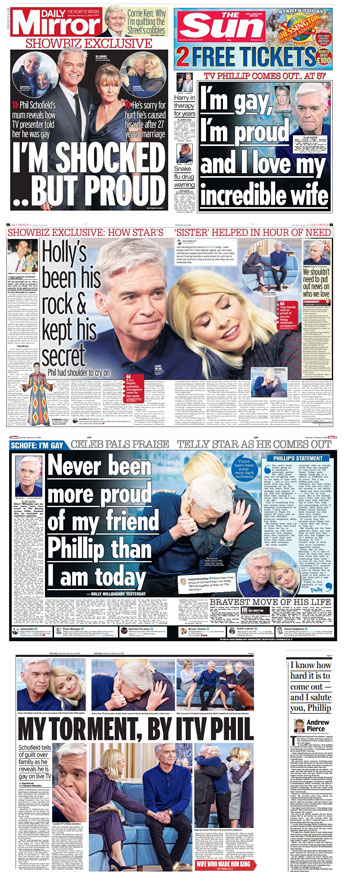
The Mail claimed this week that its Sunday sister had been investigating allegations about This Morning three years ago, but that ITV lawyers had shut the project down. What? The fearless Mail just collapsing in the face of a legal threat? Surely not. First, if it were able to substantiate the allegations, it would have a full defence against any libel claim; and second, it knows very well that there is more than one way to skin a cat and if it truly believed in the story, it would have found a way to publish. It got round Elton John’s legal constraints without too much bother. There is nothing about the programme in the paper’s cuttings from that era beyond a feature promoting a Holly Willoughby book in which she talks about her “great friend” Schofield.

Now, having failed to pursue the story at the time, it is busy demanding who at the network knew what when – specifically chief executive Dame Carolyn McCall, who was the subject of an Andrew Pierce hatchet job yesterday (referring to her throughout as Ms McCall, rather than Dame Carolyn – or plain McCall).
Never one to miss a chance to take a dig at the Guardian, he notes that she made her name in the City as its chief executive and that its “achingly woke values are imprinted in its DNA”. That little jibe was more than halfway down the story, but it was enough to justify the online heading “Just how much DID the £3.5m-a-year former Guardian chief at the helm of ITV know about the Phillip Schofield affair? Fresh questions for woke Dame Carolyn McCall amid claims of secret meetings with journalists over host's sexuality YEARS ago”.

Nadine Dorries, who wrote in her Mail column that she had not a shred of sympathy for Schofield, also told Laura Kuennsberg that complaints against him had been lodged over a “long period of time” and that ITV – and Holly Willoughby – had questions to answer. Asked whether presenters such as Schofield had too much power, she replied: “There are men, men particularly, who have positions of authority or trust and power, kind of think they are above the law and above those standards that the rest of us are held by and held to.”
Just to be clear, this is Nadine Dorries speaking. The woman who still defends Boris Johnson – a man who not only broke the laws he himself made, but who also promoted to a position in charge of party discipline a man he knew was “handsy” and whom he described as “Pincher by name, pincher by nature”.
I mention this because, in all the acres of newsprint devoted to Phillip Schofield and his real or imagined misdemeanours, it’s easy to forget that sexual impropriety is not the preserve of celebrities. Nor is bullying intolerable only when it involves people sitting on a daytime TV sofa.
Both are in evidence in newspaper offices. Both are in evidence in Whitehall and Westminster. Priti Patel gets away with a finding that she bullied staff, Dominic Raab has to quit, but is portrayed as the victim. Fifty-seven MPs are the subject of investigation after allegations of sexual misconduct. That’s one in twelve of our elected representatives – and three of them were cabinet ministers at the time.
But, hey!, let’s not look at ourselves or our friends in high places. Let’s just pile it on a household name and act holier than thou.
One for the boss
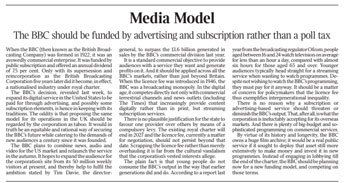
With all this focus on ITV, the BBC might have hoped to escape the attention of the newspapers this week. But up pops the Times with a solution to the puzzle that has been troubling politicians and media types for decades: how to fund the corporation, since the licence fee is outdated and unfair, given so many people don’t watch its programmes?
Out of nowhere, it produced a second leader pronouncing that it should institute an advertising-subscription model – and get on with it quickly, not wait for the next royal charter renewal negotiations. Oh, and sell off some film rights as well. This was hardly an original idea. It’s the one that has been floated a hundred times and found wanting. Especially with advertising revenues on the slide and ad-blocking technology.
Well, not quite out of nowhere. The premise for the leader was the BBC’s decision last week to expand its digital service in the US – presumably to increase its audience and generate revenue – to be paid for by advertising and subscriptions. But the US isn’t Britain. The BBC isn’t America’s public broadcaster. It’s not the same market. Different rules apply to watching the BBC overseas – you can’t watch iPlayer abroad unless you have a VPN and are a registered licence-fee payer. Nor is it the same product. Offering material online is not the same as running a national terrestrial television network.
The Times knows this very well, of course. But what might a certain proprietor think? A proprietor domiciled in America, a proprietor who has American television businesses financed by advertising and subscriptions, a proprietor who for half a century has resented the licence fee that he believes gives a rival a commercial advantage? Might he not have said: “Well if they can do it over here, make them do it over there.” Yes, sir!
Just like old times at the Express

I have the feeling I’m in a time warp. This Notebook started with an article written in 2016. That was, as though any of us could forget, the year of the EU referendum. The Daily Express was proudly in the vanguard of the battle to get Britain out of the EU and, under the previous editorship, was happy to use migration as a weapon to achieve that aim. Over the course of that year, it led on migration 72 times. When Labour-voting Gary Jones was appointed editor in 2018, he said that some of those front pages had caused him sleepless nights. The obsession with “migrants” – never refugees – ended overnight.
But this past month seems to have swept the paper back in time. There it was again, all the swagger of how great Britain would be outside of Europe – “Brexit will be roaring success”, “Coming to UK! Car plant deal worth billions”, the concerns about the “elderly issues” of diabetes and alzheimers, pensions and savings rates, devotion to the sovereign (well, in coronation month, everyone was doing that), pre-election promises of tax cuts and cheaper electricity, and seven splashes on migration. Seven in a month. Even in 2016, the average was only six (though it managed eight that May). Madeleine has returned, too, it being May – her birthday month and the anniversary of her disappearance – but she was strangely absent seven years ago. The other mystery is what happened to house prices? Oh. They’ve been falling.

Starmer fails to make a splash
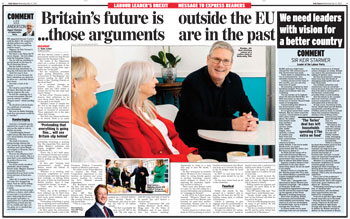
To complete the Brexity theme, the Express rounded off the month with a bylined piece from Keir Starmer promising not to take Britain back into Europe if he wins the next election. No single market, no customs union, no freedom of movement.
You have to wonder what Starmer thought he would achieve by this – other than upset Remainers, business, Brexiters, and the left. Did he really think he could woo Express readers, who are small in number and the least likely of any newspaper buyers to vote for him? One assumes he expected at least a fair shot, but while the headline was straight – “Britain’s future is outside the EU…those arguments are in the past” – and the page was flagged as an exclusive, personal, message to Express readers, the boot went in on the third par with: “But his comments provoked anger among Brexiteers, who accused him of ‘flip flopping’ and warned trusting Sir Keir with Brexit is like ‘trusting Dracula at the blood bank’.”
The Dracula comment was courtesy of Paul Bristow, fresh from his starring role in the Mail, where he had accused Starmer of caving in to the “dangerous” JSO’s demands. Rees-Mogg was there too. And James Daly, another Conservative MP. They all agreed you couldn’t believe a word Starmer said. Then, for good measure, Tory deputy chairman Lee Anderson was given his own column – 357 words against Starmer’s 670 – to say the opposition leader was a flip-flopping Corbyn supporter who would say anything to get his hands on the keys to No 10. His love affair with Europe would never end and he would drag us back in.
All of this was on pages 8 and 9, behind migrants, an attack on the BBC and the Holly and Phil saga. Every new Rishi promise makes a splash, but this personal exclusive message to Express readers from the man widely expected to be our next PM warranted not even a puff on the front.
As I say, whatever was Starmer thinking of?
LibDem council? Yes, but…
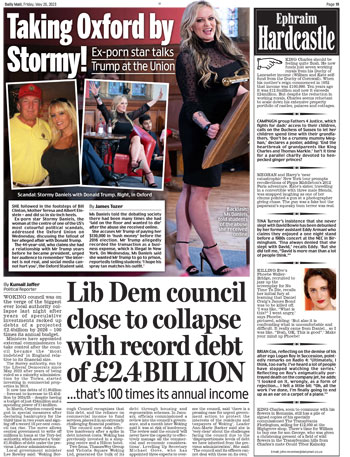
Facts are sneaky little things aren’t they?
This headline from the Mail is true. It is a LibDem council. It has huge debts. You might think it reasonable to assume that the two are connected. But they aren’t. They are disjointed facts.
The Liberal Democrats took control of Woking council in March last year – after the budget had been set. The “years of speculative investments” that “racked up” the projected £2.4bn debt were undertaken under a Conservative minority administration.
It’s all there in black and white, like the keys on Eric Morecambe’s piano. But, like his playing, not necessarily in the right order.
Front page of the fortnight
Can’t say I’ve been overwhelmed by any offering this time, perhaps because I’ve been so put off by the Schofield obsession. But for a pop front, I guess this was, simply, the best.

Liz Gerard’s Notebook is a fortnightly column published in the InPubWeekly newsletter. To be added to the mailing list, enter your email address here.












